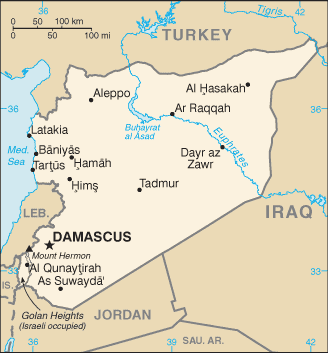The Obama administration has retreated from its initial refusal to stay out of the conflict in Syria by agreeing this week to provide direct humanitarian and communications assistance to the Syrian opposition.
 While the change in policy did not go as far as providing military assistance – administration officials say the military option and military aid is still off the table – the news is a troubling sign for the antiwar movement. “These moves are going to invest the U.S. in a much deeper sense with the opposition,” one administration official told Josh Rogin at Foreign Policy. “U.S. policy is now aligned with enabling the opposition to overthrow the Assad regime. This codifies a significant change in our Syria policy.”
While the change in policy did not go as far as providing military assistance – administration officials say the military option and military aid is still off the table – the news is a troubling sign for the antiwar movement. “These moves are going to invest the U.S. in a much deeper sense with the opposition,” one administration official told Josh Rogin at Foreign Policy. “U.S. policy is now aligned with enabling the opposition to overthrow the Assad regime. This codifies a significant change in our Syria policy.”
Agreeing to give non-military aid to the Syrian opposition drastically increases the likelihood that substantial military assistance, from the U.S. or some other allied country, will soon be introduced. And establishing an official policy of regime change in Syria amounts to a policy of radical imperialism. This opens the floodgates for yet another war of choice by the Obama administration.
The worsening civil war in Syria and the brutal crackdown by the regime of Bashar al-Assad had prompted months of pressure in Washington for a full-scale intervention, and Senator John McCain just Monday argued for airstrikes across Syria. But the administration had resisted the pressure.
It is clear the administration had merely tactical difficulties with intervention, as opposed to recognizing it as wrong. For example, one reason a no fly-zone hasn’t caught support is because Russian aid to the Assad regime includes sophisticated air-defense systems that could at least partially stand up to U.S. aggression.
But the purportedly limited, non-military aid the administration has now agreed to still carries all the same problems it always has. The Syrian opposition is not cohesive, so getting aid to the intended people is nearly impossible. The opposition contains elements of extremists and perhaps al-Qaeda, which the administration may indirectly end up aiding. Both sides have committed crimes and, as was seen in Libya, supporting an armed insurrection empowers disreputable fighting groups while marginalizing prospects for political peace. Furthermore, intervention carries a high probability that the violence will consequently escalate, spread across the region, and embroil the United States in another deadly, protracted war in the Middle East.
All of this is aside from the fact that the Obama administration has no authority to pick sides in a civil conflict which poses no threat to the United States. It is also likely that ulterior motives are at play: Washington wants to end the Assad regime and possibly replace it with a more obedient tyranny that will no longer align itself with Iran, the number one target among imperialists and foreign policy elites.
The new plan has reportedly not yet been initiated as the administration still has no concrete plan for how to get the direct assistance to the Syrian opposition and is still debating specific packages among cabinet-level officials. But this new policy opens up a new chapter in the Syrian conflict and it is bound to worsen considerably because of it.


